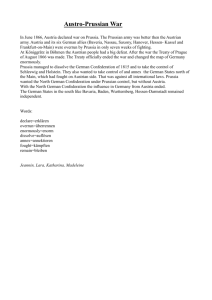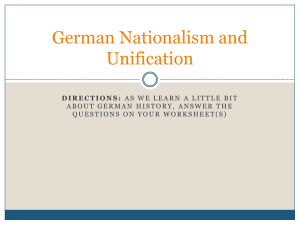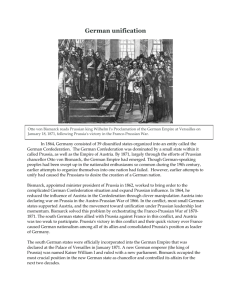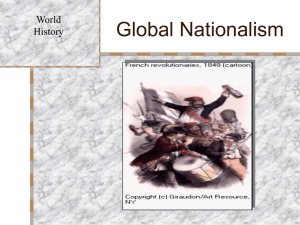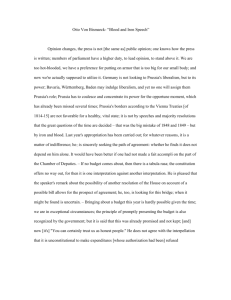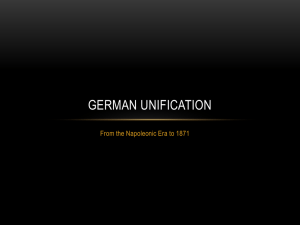HIST2128 Germany, 1871-1933: From Empire to Republic
advertisement
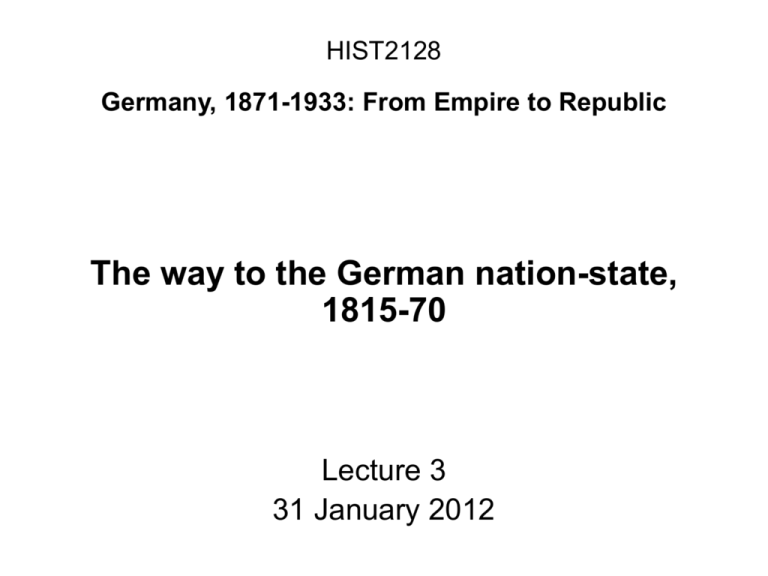
HIST2128 Germany, 1871-1933: From Empire to Republic The way to the German nation-state, 1815-70 Lecture 3 31 January 2012 Congress of Vienna, 1814-15 – Principles Restoration: of political situation of 1792 Legitimacy: to justify dynastical claims of Ançien Régime Solidarity: common policies of legitimate princes against revolutionary ideas + movements → Created a new European order as balance of power of 5 great powers (GB, R, F, A, Pr) → Made Prussia a permanent member of ‘Club of Big 5s’ → Paved way to set up ‘German Confederation’ Congress of Vienna, 1814-15 – Results Territorial results for Prussia: Gained Northern Saxony + the Rhineland + Westphalia + Western Pomerania + Danzig + Thorn + Posen = Bulwark function at Rhine River (Prussian Western territory) against France = Separated Prussia into 2 economical + confessional very different territories = Future focus of Prussia more to West than to East German Confederation, 1815-66 (1) • Act of Confederation, Jun 1815: → ‘… to preserve the internal and external security of Germany and the independence and inviolability of the German states’ (Art. 2) • • • • • • 39 members: 35 princes + 4 other rulers: Incl. King of Britain (Hanover) Incl. King Denmark (Holstein) Incl. King of Netherlands (Luxemburg) Incl. Austria (only partly) Incl. Prussia (only partly) German Confederation, 1815-66 (2) • Bundestag at Frankfurt → Permanent meeting of ambassadors under chairmanship of Austria • Assembly of the Confederation → Non-permanent + occasionally • Army of the Confederation → Individual contingents supplied by member states • Permitted to set-up local assemblies + constitutions in member states → a concession to liberalism • But no uniform finances, law, traffic, economy Zollverein (Customs Union), 1834 Prussia + most German states but not Austria • Net Value of Production in Gulden, 1840s Economic Sector Customs Union Austria Agriculture 46,3 27,6 Small business 15,2 3,6 Industry 8,1 4,0 Total production 70,0 35,0 Customs Union: Myth + Reality = An immediate step to German unification? But: • No ‘national’ intention but predominantly economic reasons • Earlier resistance due to structural difficulties, not to Austrian negative influence = A ‘side confederation’ to German Confederation dominated by Prussia (but not by Austria as GC) = Strong integrating influence on CU members who gave up substantial parts of sovereignty = A kind of substitute for lacking national unity National question ‘Third Germany’ not prepared to close ranks with Austria without Prussia → No reform of GC • Bismarck successful: Austria forced to change politics vs. Prussia + to search for common interests with Prussia = Crucial precondition for Prussia’s future offensives in Central Europe Schleswig-Holstein Question (1) • Duchy of Schleswig: mixed Danish & German population Duchy of Holstein: entirely German population • Both Duchies under Danish rule but Treaty of Ripen (1460): ‘Never be divided’ (up ewig ungedeelt) • Holstein member of German Confederation (since 1815) but not Schleswig: Danish king member of GC • German nationalist uprising of S-H in 1848 unsuccessful • Treaty of London (1852:) Permitted only personal no real union between DK + S-H to secure independence of S-H Schleswig-Holstein Question (2) • Rising Danish nationalism strived to incorporate Schleswig but not Holstein • Danish king Frederick VII declares London Treaty of 1852 as invalid + declares incorporation of Schleswig into DK (Mar 1863) • Military occupation of Holstein by GC troops to show readiness to attack DK (Oct 1863) • Death of Frederick VII + Christian IX new Danish king: Not accepted by Schleswig-Holsteiners + German nationalists • Prince of Augustenburg proposed as new ruler of independent S+ setting up of ‘exile government’ H War with Denmark (1) • Military victory of Prussia-Austria over DK (spring 1864) • Occupation of Schleswig-Holstein by Prussian & Austrian troops • Bismarck strongly opposed to plans of independent S-H: Only satellite state of Prussia tolerable for him • New London Conference on S-H with no agreement due to DK defiance (Apr-Jun 1864) • Fresh war + complete surrender of DK (Jul 1864) War with Denmark (2) Treaty of Vienna (Oct 1864): → Danish king relinquishes his traditional rights in S-H = DK lost 33% of population + 40% of territory → Joint sovereignty of Prussian & Austria of S-H: Schleswig occupied by Prussia + Holstein by Austria = Bismarck extremely popular figure in Prussia = Austria’s administration of Holstein regarded by Bismarck as convenient stumbling-block to start diplomatic quarrels with Austria

